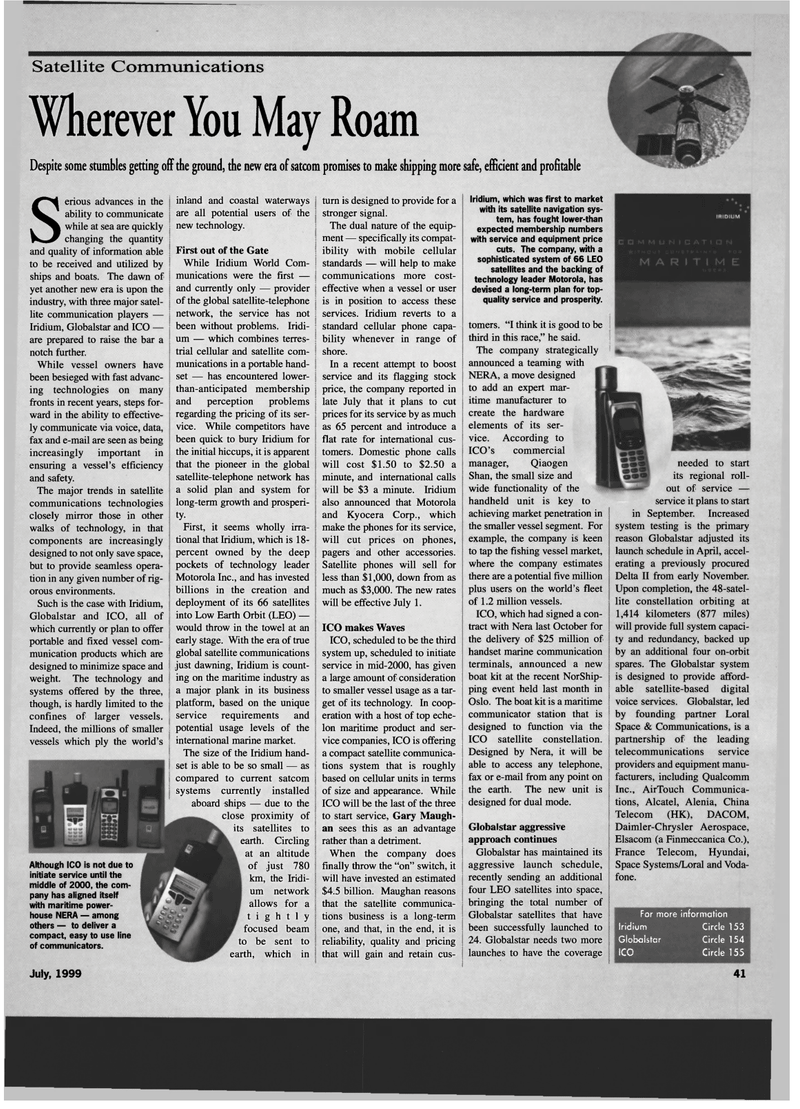
Page 41: of Maritime Reporter Magazine (July 1999)
Read this page in Pdf, Flash or Html5 edition of July 1999 Maritime Reporter Magazine
Satellite Communications
Wherever You May Roam
Despite some stumbles getting off the ground, the new era of satcom promises to make shipping more safe, efficient and profitable
Serious advances in the ability to communicate while at sea are quickly changing the quantity and quality of information able to be received and utilized by ships and boats. The dawn of yet another new era is upon the industry, with three major satel- lite communication players —
Iridium, Globalstar and ICO — are prepared to raise the bar a notch further.
While vessel owners have been besieged with fast advanc- ing technologies on many fronts in recent years, steps for- ward in the ability to effective- ly communicate via voice, data, fax and e-mail are seen as being increasingly important in ensuring a vessel's efficiency and safety.
The major trends in satellite communications technologies closely mirror those in other walks of technology, in that components are increasingly designed to not only save space, but to provide seamless opera- tion in any given number of rig- orous environments.
Such is the case with Iridium,
Globalstar and ICO, all of which currently or plan to offer portable and fixed vessel com- munication products which are designed to minimize space and weight. The technology and systems offered by the three, though, is hardly limited to the confines of larger vessels.
Indeed, the millions of smaller vessels which ply the world's
Although ICO is not due to initiate service until the middle of 2000, the com- pany has aligned itself with maritime power- house NERA — among others — to deliver a compact, easy to use line of communicators. inland and coastal waterways are all potential users of the new technology.
First out of the Gate
While Iridium World Com- munications were the first — and currently only — provider of the global satellite-telephone network, the service has not been without problems. Iridi- um — which combines terres- trial cellular and satellite com- munications in a portable hand- set — has encountered lower- than-anticipated membership and perception problems regarding the pricing of its ser- vice. While competitors have been quick to bury Iridium for the initial hiccups, it is apparent that the pioneer in the global satellite-telephone network has a solid plan and system for long-term growth and prosperi- ty-
First, it seems wholly irra- tional that Iridium, which is 18- percent owned by the deep pockets of technology leader
Motorola Inc., and has invested billions in the creation and deployment of its 66 satellites into Low Earth Orbit (LEO) — would throw in the towel at an early stage. With the era of true global satellite communications just dawning, Iridium is count- ing on the maritime industry as a major plank in its business platform, based on the unique service requirements and potential usage levels of the international marine market.
The size of the Iridium hand- set is able to be so small — as compared to current satcom systems currently installed aboard ships — due to the close proximity of its satellites to earth. Circling at an altitude of just 780 km, the Iridi- um network allows for a tightly focused beam to be sent to earth, which in turn is designed to provide for a stronger signal.
The dual nature of the equip- ment — specifically its compat- ibility with mobile cellular standards — will help to make communications more cost- effective when a vessel or user is in position to access these services. Iridium reverts to a standard cellular phone capa- bility whenever in range of shore.
In a recent attempt to boost service and its flagging stock price, the company reported in late July that it plans to cut prices for its service by as much as 65 percent and introduce a flat rate for international cus- tomers. Domestic phone calls will cost $1.50 to $2.50 a minute, and international calls will be $3 a minute. Iridium also announced that Motorola and Kyocera Corp., which make the phones for its service, will cut prices on phones, pagers and other accessories.
Satellite phones will sell for less than $1,000, down from as much as $3,000. The new rates will be effective July 1.
ICO makes Waves
ICO, scheduled to be the third system up, scheduled to initiate service in mid-2000, has given a large amount of consideration to smaller vessel usage as a tar- get of its technology. In coop- eration with a host of top eche- lon maritime product and ser- vice companies, ICO is offering a compact satellite communica- tions system that is roughly based on cellular units in terms of size and appearance. While
ICO will be the last of the three to start service, Gary Maugh- an sees this as an advantage rather than a detriment.
When the company does finally throw the "on" switch, it will have invested an estimated $4.5 billion. Maughan reasons that the satellite communica- tions business is a long-term one, and that, in the end, it is reliability, quality and pricing that will gain and retain cus-
Iridium, which was first to market with its satellite navigation sys- tem, has fought lower-than expected membership numbers with service and equipment price cuts. The company, with a sophisticated system of 66 LEO satellites and the backing of technology leader Motorola, has devised a long-term plan for top- quality service and prosperity. tomers. "I think it is good to be third in this race," he said.
The company strategically announced a teaming with
NERA, a move designed to add an expert mar- itime manufacturer to create the hardware elements of its ser- vice. According to
ICO's commercial manager, Qiaogen
Shan, the small size and wide functionality of the handheld unit is key to achieving market penetration in the smaller vessel segment. For example, the company is keen to tap the fishing vessel market, where the company estimates there are a potential five million plus users on the world's fleet of 1.2 million vessels.
ICO, which had signed a con- tract with Nera last October for the delivery of $25 million of handset marine communication terminals, announced a new boat kit at the recent NorShip- ping event held last month in
Oslo. The boat kit is a maritime communicator station that is designed to function via the
ICO satellite constellation.
Designed by Nera, it will be able to access any telephone, fax or e-mail from any point on the earth. The new unit is designed for dual mode.
Globalstar aggressive approach continues
Globalstar has maintained its aggressive launch schedule, recently sending an additional four LEO satellites into space, bringing the total number of
Globalstar satellites that have been successfully launched to 24. Globalstar needs two more launches to have the coverage needed to start its regional roll- out of service — service it plans to start in September. Increased system testing is the primary reason Globalstar adjusted its launch schedule in April, accel- erating a previously procured
Delta II from early November.
Upon completion, the 48-satel- lite constellation orbiting at 1,414 kilometers (877 miles) will provide full system capaci- ty and redundancy, backed up by an additional four on-orbit spares. The Globalstar system is designed to provide afford- able satellite-based digital voice services. Globalstar, led by founding partner Loral
Space & Communications, is a partnership of the leading telecommunications service providers and equipment manu- facturers, including Qualcomm
Inc., AirTouch Communica- tions, Alcatel, Alenia, China
Telecom (HK), DACOM,
Daimler-Chrysler Aerospace,
Elsacom (a Finmeccanica Co.),
France Telecom, Hyundai,
Space Systems/Loral and Voda- fone.
For more information iridium Circle 153
Globalstar Circle 154
ICO Circle 155
July, 1999 41

 40
40

 42
42
